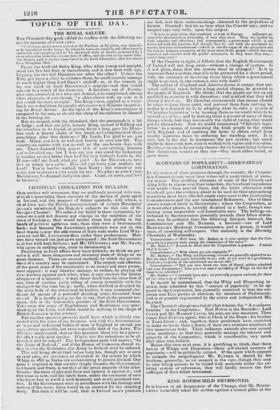CHRISTIAN LEGISLATION FOR IRELAND.
OUR readers will remember, that we uniformly received with eon- sileiab'e incredulity those accounts of the decline of party-spirit in Ireland, and the prospect of future quietude, with which, a
shirt time ago, the Dublin correspondents of certain Ministerial joeinals entertained his Majesty's subjects on this side of St.
George's Channel. We refused our belief to these statements, be- cause we could not discern any change in the condition of the mass of Irishmen, that would render them less pliable in the
hands of political agitators now,- than they were a twelvemonth back; and because the Ascendancy gentlemen were not in the least degree nearer the atta'nment of their ends under Lord Wan- neseeer and Mr. LITTLETON than under their predecessors. Mat- ters have turned out just as we anticipated : the Irish Government . is at war with both factions; and Mr. O'CONNELL and Mr. SHAW, who agree in nothing else, unite in denouncing it.
Perplexing as Irish affairs have been hitherto, we think we per- ceive a still more dangerous and alarming state of things at no great distance. There are several methods by which the govern- ment of a country may be maintained. The respect and affection of the great mass of the community is its surest and most perma- nent support : it may likewise manage to endure, by playing off rival fbctions against each other, when it only receives the hearty allegiance of a minority : it may. throw itself into the arms first of one, then of another party, siding of course invariably with the strongest for the time being : lastly, when disliked or despised by the main body of the nation and its leaders, it may command obe- dience by means of a powerful standing army, furnished from ale sad. It is hardly going too far to say, that at the present mo- ment, this is the lamentable position of the Irish Government. Take away the army of Englishmen and Scotchmen now quar- tered upon the Irish, and there would be nothing in the shape of British dominion in the country.
But another question presents itself here, which is closely con- nected with the state of our finances, and with the determination of large and influential bodies of men in England to curtail our expeteliture generally, but more especially that of the Army. The Ministry mustexpeci, that on this question there will be a power- ful eftbst made next session. Where are the reductions to be ef- fected, it will be asked ? The Independent party will answer,"In the Army of Ireland ;" and if the House of Commons should re- fuse to vote the Estimates, the Army in Ireland must be reduced.
This will bring about (and before long too, though not so soon as next year, we presume) an alteration in the system by which Whigs as will as Tories are endeavouring to govern Ireland. Our army i • required in that country simply because the Government, in Church and State, is not that of the great majority of the inha- bitants: the mass of physical force and opinion is against it ; and this mass is now, and has lately been, under the command of men who know how to wield it with dexterity and newlyspractised cau- tion. If the Government were in accordance with the feelings and notions of the mass, there would be no occasion for the standing army. But then it will be said, that in Ireland men's passions
"..11111011
are bad, and their understandings obscured by the prejudices of faction. Granted : but let us hear what the Courier says, and we suspect says very truly, upon this subject.
" It is to us quite plain, that.mankind, at least in Europe, nolonger go.. verned by abstractions or mincipleS, if ever they were. They are _guided by their impulses and affections ; and, consequently, a government which is not connected with the passions, bad though they he, and with the presumed in- terests,. however misunderstood—which is not the organ of the prejudices and the fancies, however erroneous, of the great mass of the people—which does not represent and coincide with the public sentiments, be they what they may— cannot long exist."
If the Courier is right, it follows that the English Government of Ireland will not long exist—without a change of system. h- it not °plain, then, that the system must be changed ? Is it so superexcellent a system, that it is to be preserved for a short period, With the certainty of involving every thing which a government ought to protect, in one-common ruin with itself?
The author of England and America deems it certain that uni- versal suffraee must, before a long period elapses, be granted to the people of England. He thinks that the people are not as yet qualified to exercise it with discretion; and is afraid that they will obtain it too scion. He therefore recommends that means should be taken to keep them quiet, and prevent them from uniting to- gether in a demand for it, by adopting what he Calls a system of "Christian legislation"—by treating them as we would wish to be treated OUT;:elVeS ; and by making them a present of many of those things which, had they universally the right of voting, they would get for themselves. Now we would recommend "Christian legis- lation" as a means of reconciling the Irish people to the union with England, and of enabling the latter to obtain relief from sundry injurious taxes by reducing her standing army. It is very late in the day to commence the new system; but much might be done even now, were it worked with vigour and discretion. Besides, it seems to be'our only chance: for no human being believes that things can remain as they are—they must either mend, or grow worse.














 Previous page
Previous page